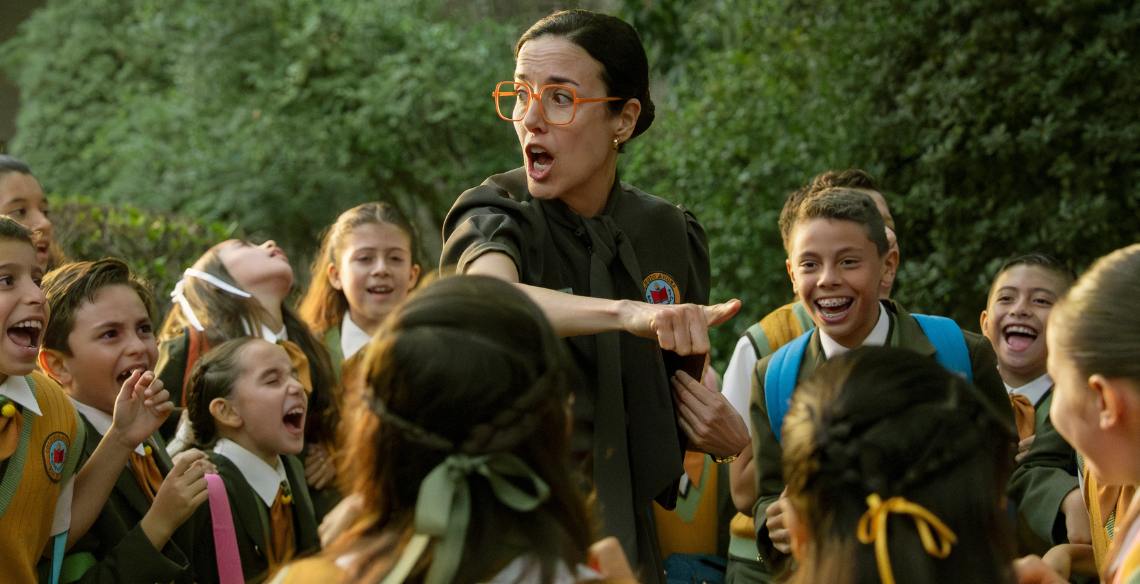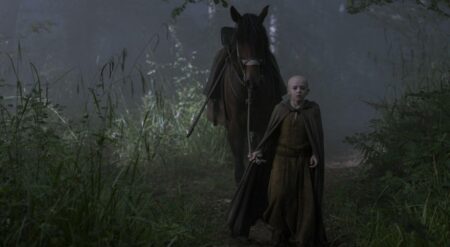Snakes and Ladders (Serpientes y Escaleras), a Netflix Mexican dramedy directed by Manolo Caro, with writing by Alexandro Aldrete, Ángela Armero, Estíbaliz Burgaleta, and Manolo Caro, follows Doris López (Cecilia Suárez) as she seeks to become the headmistress of the private school where she works. But when an unassuming exchange between two young students triggers an improbable chain of events, Doris finds herself doing things she never thought she would in pursuit of what she wants.
Creating art is hard. Whether it is the work of a single individual or that of a huge team, the complexities of the creative process are difficult to grasp for anyone who has not undertaken the endeavor themselves. It is in no small part for this reason that I always strive to find good things to say, even when I don’t like the bulk of what a piece of art does. Sometimes things just don’t come together, no matter how passionate or dedicated a team is. Sadly, I find myself at a loss to say practically anything nice about Snakes and Ladders (2025).
The word one would use to describe the overwhelming feeling that persists when thinking back over the roughly five hours it takes to watch this show is unpleasant. It feels like the show strives to create quirky, awkward situations—ones that leave a bit of discomfort but entertain and maybe even illicit a laugh or two. It never works.
Intead, the show squanders its runtime by following a bunch of unlikeable people around as they backstab and screw each other over in their petty plays for small-time power. By the end of the series, none of the major characters are in a position to be cheered for, and the fact that any of them get what they want feels like a crime in and of itself.
Characters don’t have to be easy to like, but they do need to be engaging; they’re not in Serpientes y Escaleras.

While most of the cast is irredeemable from the start, the biggest disappointment is the arc that Snakes and Ladders (2025) takes its lead, Doris, on. Initially, Doris is a well-meaning, if a little stuck-up character. Her unwillingness to bend from her ethical code seems to set up a strong, if predictable, conflict with the unfolding circumstances around her. As others bend the rules, Doris will have to struggle with how far she’s willing to bend. Right?
As it turns out, no, that’s not right. Rather than do any form of exploration with the protagonist, the series simply lets her slip into the conniving world of politics and corruption, without a shred of internal conflict or self-analysis. It just happens. Even those around her rarely take note of the things she does, and how recently she never would’ve dreamt of doing such things. This leaves the character’s journey through the story feeling meaningless.
The show reaches its most unbearable though as it explores the burgeoning kinks of the antagonist couple, Vencente and Tamara. The moments where they explore their newfound love for socially inappropriate sexplay feel like an attempt at humor, but are as far from it as you can get.
It’s awkward and uncomfortable, insensitive to others, and sometimes even crosses the line to being emotionally abusive of a character who is unwillingly drawn into their play. Sex can be used well in storytelling, but this feels like an excuse to splash tits and butts on the screen a few times.
Netflix’s Snakes and Ladders just doesn’t know how to handle intimacy.

The only character that escapes the unappealing mess of Snakes and Ladders writing is Doris’ son, Toño (Benny Emmanuel). A closeted homosexual, the way the story presents him and his struggles delivers the one character that leaves the viewer with a good feeling. The obstacles he has to face as his status is forced into the open without his consent craft the only empathetic story the narrative manages to bring. However, even this largely strong sub-plot doesn’t manage to stick the landing.
How Toño’s story wraps up feels disingenuous at best. Given how negative the rest of the film’s messaging is when it comes to the generally disappointing nature of people, that this plot gets tied up with a happy little bow feels ridiculous. It goes as far as having the local right-wing political party, whose leader was spouting some extreme homophobic remarks at the start of the film, embrace the boy because Instagram fans stood by him when he was outed. Of all the bizarre elements of this movie, that one feels the least believable. Sad as that is.
The only other genuinely positive thing about Snakes and Ladders is that the series takes some surprising turns. The plots are unpredictable, even if the execution of the stories themselves leaves much to be desired.
In the end, Snakes and Ladders fails far more than it succeeds. While it feels like the series tries to craft a quirky dramedy about political corruption, it almost universally falls flat. Its unlikable cast and uncomfortable situations never bring laughs, and give few reasons to cheer, other than when the final credits roll.
Snakes and Ladders (2025) is streaming now on Netflix.
Snakes and Ladders
-
Rating - 2/102/10
TL;DR
In the end, Snakes and Ladders fails far more than it succeeds. While it feels like the series tries to craft a quirky dramedy about political corruption, it almost universally falls flat.







